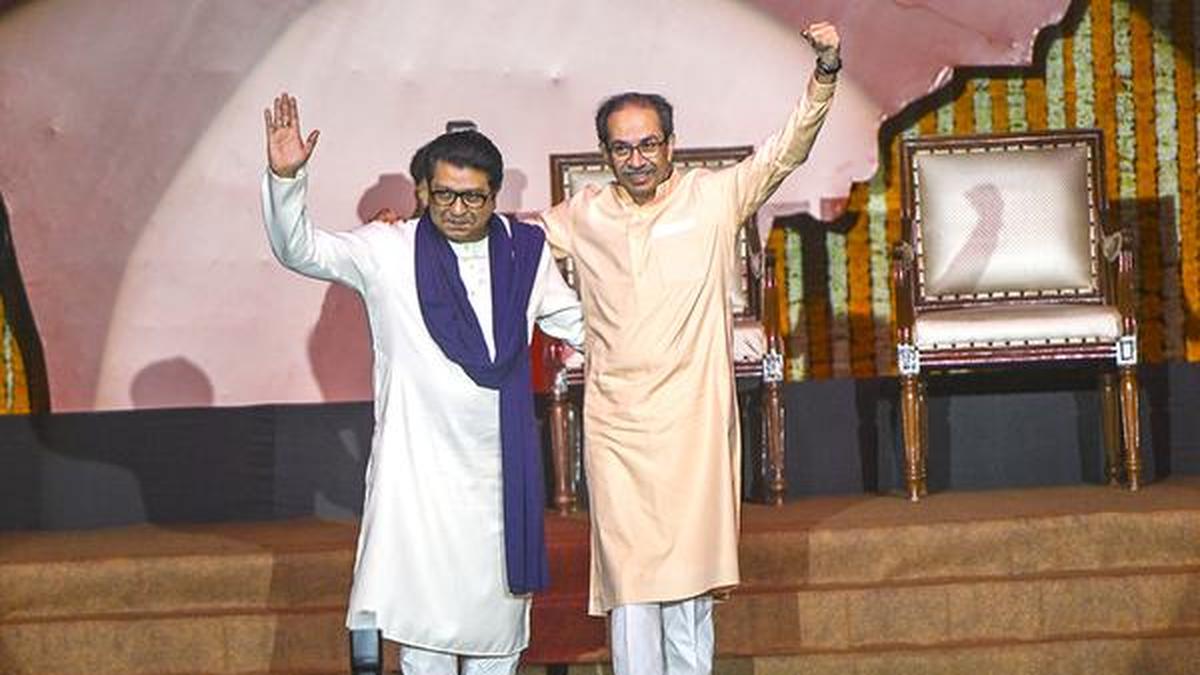(This is the latest edition of the Political Line newsletter curated by Varghese K. George. The Political Line newsletter is India’s political landscape explained every week. You can subscribe here to get the newsletter in your inbox every Friday.)
The attempt by the BJP-led State government to promote Hindi has opened up new space for the cousins. It remains to be seen whether the sagging political fortunes of the cousins could be revived because of language politics. Bal Thackeray combined Marathi and Hindu identity; the BJP took over the Hindu identity space from the Sena and rose to become the leading force in the State in the last decade. Raj has said he is “Marathi and Hindu” as opposed to “Hindi and Hindu.”
Simultaneously, a controversy over Deputy Chief Minister Eknath Shinde raising ‘Jai Gujarat,’ along with Jai Maharashtra, at an event has erupted. During the 2021 Assembly elections, West Bengal CM Mamata Banerjee had said she would not allow “Gujaratis to rule West Bengal.” Ms. Banerjee tries to claim a distinct Bengali, Hindu identity. In that sense, she mimics the Thackerays, in trying to create a vernacular Hindu politics. The State government built a Jagannath Dham in West Bengal, much to the discomfort of the Odisha government. The custodians of the Puri Jagannath temple were up in arms. You can read our reporting here.
Between the censuses of 2001 and 2011, Hindi speakers in Maharashtra grew by 35.57% while Marathi speakers grew by 16.23%. In the same period, the percentage of people with Hindi as their mother tongue has risen to 43.63% from 41.03%, country wide, and Hindi is the fastest growing language in India. The new census will likely prove that this trend continues.
Past and future in TN politics
Archaeological excavations at Keeladi near Madurai in Tamil Nadu continue to animate politics in the State. The antiquity of the Tamil people and delimitation are set to be key campaign issues in the Assembly elections in the State next year. At the heart of the debate is the question whether Tamil Nadu had ancient urban settlements. The TN government has asked the Centre to release the latest findings from the excavation. Experts from Liverpool John Moores University in England studied the skulls excavated from Keeladi and reconstructed the facial features of ancient people who lived around 2,500 years ago.
While the Indus Valley Civilization has been proven as urban, the exact nature of Keeladi settlements remains a dispute. While the State government’s archaeology department has concluded that the settlement that dates back to the 6th century BCE was indeed urban, some experts in archaeology feel there must be more evidence before that conclusion can be reached. The lead archaeologist for the first two phases was asked by the Archaeological Survey of India to rewrite his report. He refused and his successor thinks there is no continuity in the structures found in the excavation.
Politics is often based on disputes rather than conclusions. Tamil identity politics always had claims of antiquity and fears of dominance by the north.
All in a name
The Central Board of Film Certification thinks the name Janaki, which is another name of Sita, the wife of Rama in the epic Ramayana, cannot be part of a film title. The matter is now in the Kerala High Court. Union Minister and BJP leader Suresh Gopi is the lead actor in the film. The reasoning of the Censor Board is that the title cannot be allowed as the character Janaki is a victim of sexual assault. There are many films that have Janaki in the title that are approved by the Board. A counsel of the Censor Board cited a norm that films are not supposed to have ‘adverse references to religion or caste.’ “To this, counsel for the petitioner firm contended that the character Janaki portrayed in the film was a fighter for justice. The court observed that the character was a victim who was fighting for justice, and not an accused.” The arguments of the Board and the filmmakers and the observations of the Court, all seem to agree in principle that a human fictional character can use the name Janaki only when they meet certain qualities. That is certainly an interesting line of reasoning and application of law and norms. That sets a new bar, a very high one, for the mortals among us. Would it be possible that in the future, Indians may be called upon, nay forced by law, to live up to the character of the names that someone with pious intentions had given them?
Russia woos Afghanistan
Russia became the first country to accord recognition of the Taliban regime in Afghanistan, and it is only to be expected that the latter’s location as a battlefield of grand power conflicts continues. I considered saying history comes a full circle in Afghanistan, but then this might be just another chapter. Islamists, including the forebears of the Taliban in Afghanistan, gained legitimacy in the West as fighters against the Soviet occupation of the country. Now, with Russia and the West locked in an intense geopolitical conflict both in Europe and West Asia, this new alignment between Moscow and Kabul is notable.
Published – July 06, 2025 11:12 am IST
